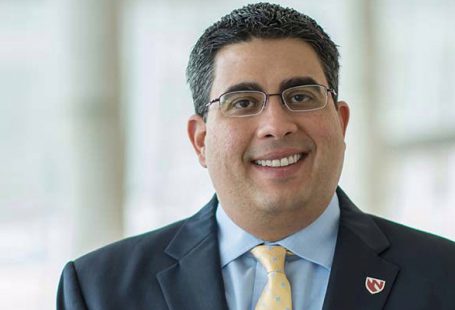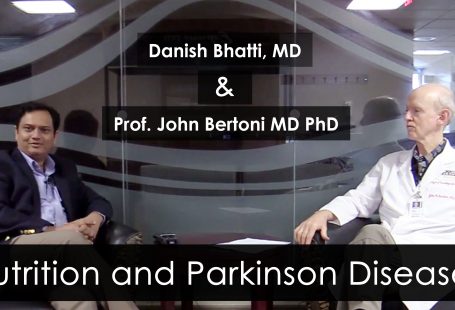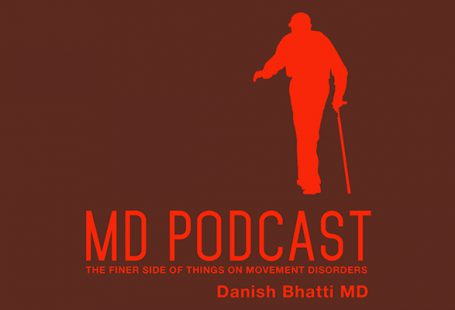
Today we’re doing an innovative podcast where we will blend in a lecture on Tourette’s syndrome along with a podcast with a question submitted to me from the course participant in movement disorder online course from Pakistan.
Danish Bhatti: So I will go through the slides as I mentioned before and whenever the questions come up I will ask the audience presence the questions. Let me introduce who is present with us today. I have Professor John Bertoni MD PHD who is a professor of neurology and has been doing Parkinson’s disease for over 20 years but is an expert in all different movement disorders. We have Dr. Amy Hellman who is the director of Huntington’s Disease Center of Excellence and an Assistant Professor in department of neurology at UNMC. We have Dr. Seier who is Assistant Professor just joined us from University of Oregon and we have Reagan iske who is a case manager who manages all our movements disorder cases and we have our movement disorder fellows Dr. James Shu who is a second year fellow in movement disorders and Dr. David Whittney who is a first year movement disorders fellow. Very good you can all say hello to everyone.
So I’m going to start with the lecture here so we’re talking about tics disorders and a main focus on Tourette’s syndrome and I’m Danish Bhatti, an assistant professor in the Department of neurological sciences. We will try to review the clinical diagnosis of tic disorders and Tourette’s syndrome and describe the phenomenology and better physiology of various tics and identify tics from stereotypies and dystonia and review behavioral and pharmacological treatments in patients with tics and Tourette’s syndrome.
How common are tics? They are affecting nearly 4% of population under age 17 that most kids grow out of tics so the incidence falls significantly after that age and it may be even higher at younger age so in a second grade or a third grade classroom. There may be as many as 20% to 25% kids with tics and compared with restless leg syndrome which is 10% but compared to Parkinson’s disease which 1% after age 60.
All right. So let’s start with the definition of a tic. Tic is any brief movement or sound that occurs intermittently and unpredictably in a non rhythmic fashion out of normal motor activity although tics can appear as the result of a direct brain injury the most commonly a idiopathic impart of the spectrum of Gilles De la Tourette syndrome. So they can be of any type or variety and we will look at that later on. What characterizes that take is that it stereotyped meaning that it’s the same movement occurring every time repetitively. It is involuntary or semi voluntary movement and can be a motor movement or could be a sound or vocal tic. A motor movement if it produces sound and is the sound which is the main characteristic of the relieving factor for the movement then we will still call it a phonic tic or a vocal tic so it could be snapping the fingers at the sound or that we hear from snapping the finger is the one that releases anxiety and It would be called a phonic tic and not a motor tic. It’s usually simple and coordinated movement which can be very complex. It could be a series of sequential movement gestures utterances that mimic fragments of normal behavior and most individuals will tic describe a premonitory urge or sensation of feeling of tension within a muscle or something that makes them do that movement and that urge or sensation is relieved up in performing that particular movement.
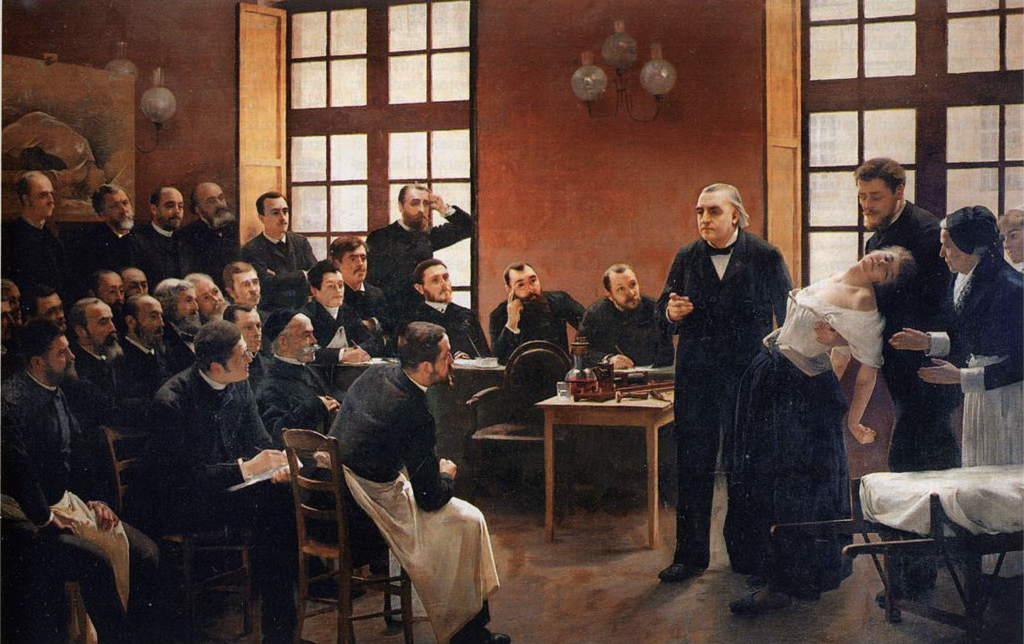
Very good. So here are some questions submitted to the characteristic of a tic disorder. So this is a question from Dr. Sohaib Anwar. He’s asking how do you differentiate between tics and parakinesia because these are also coming out of voluntary motor actions
Amy Hellman MD: I think the main differentiation there is kind of two things but the main thing is the urge that uncomfortable sensation that is not present in parakinesia. Parakinesia is trying to blend in an involuntary movement that has no preceding urge is not suppress the ball. So I guess that includes the other parts, versus a tic which is a movement of some sort that is required to relieve the sensation so the movement is voluntary but the sensation is involuntary and the parakinesia, it’s a voluntary movement added on to an involuntary movement.
Danish Bhatti: Okay. Dr. Bertoni you have anything to add.
Dr. John Bertoni: Well I just along those lines if somebody has a parakinesia they don’t feel better by letting it happen. There’s no major urge to do so. It doesn’t really bother them maybe it bothers other people. So what I want to say is you know the tics are said to be stereotyped but they do vary. You may have one form of tic and then a month later you may have a different tic that is your latest thing and there have been cases where two people are sitting outside the urologists office with different tics and by the time they leave they have each other’s tics. So they start imitating the other one in a kind of an odd way. So they tend to be.
Danish Bhatti: Yeah. I think what we were trying to convey there was that a particular movement for it to be tic has to be exactly the same to relieve the tension so it can not be that you half way if you do the movement or some form of that movement you feel better. That is not exactly a tic which actually leads me to the next question. Again from Dr. Sohaib Anwar is that how then you differentiate a genuine tic from someone who is — or faking tics. And that’s where I think that point is relevant is that someone who is appears to be making a tic may not do the movement exactly the same. And if the movement is not precisely the same if any kind of a movement of the neck will make them feel relieved and it’s varying from movement to movement that it may not actually be a real tic. We have any other pointers or clues that you guys use to differentiate faker or malingerers who may not actually have a tic.
Mara Seier MD: Tics can also be the impressable and suggestible and distractable. No. So it doesn’t make it. But I think suppressibility actually is useful. Many malingerers actually choice if it is not suppressible. So I have actually seen that you someone who was making a tic and I say okay can you hold it and they say I cannot hold it and it cannot be a tic, should be suppressive. Very good. So the other question related to the same question in terms of tic is a question about — and mannerisms. How do you differentiate them from the tic it’s been asked from many of the participants said Dr. Muslim Lakhair, Dr. Farheen Niazi, Saba Zaidi, Kiran Qureshi all asking the same question is that how do you differentiate stereotypes and mannerism kind of a leg movement or shaking some people have from a tic.
Dr. John Bertoni: Well a leg movement like leg bouncing is not so I mean that’s something that you can stop if you ask them to. There’s no urge to keep doing it. I think mannerisms if you have a professor when he’s out of the room or you think he is, you can imitate him by the way he fidgets with his classes. These are you know just mannerisms not tics but I think there’s people just blend in to both of them. I think some mannerisms and people are tics especially if you have more of them as a kid like throat cleaning you know. Right. Almost considered a mannerism but it might actually be a tick. What do you guys think how would you differentiate stereotype.
Mara Seier: I think it goes back to what Dr. Hellman said is that urge and there’s no urge behind stereotype and typically I mean you often see them in people who are a developmental delay or have some intellectual disability and so there’s really not that urge behind the movement and it’s repetitive and looks very consistent where it kind of ticks can change.
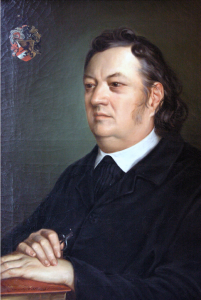 Danish Bhatti: I think that’s a very good point especially I was thinking about this that stereotypes although they can be anything but actually they do have some specific patterns. So there’s a handwringing stereotype of the autism and RED syndrome down syndrome patients have this kind of shaking of their body, rocking in the chair of stereotype, tardive stereotypes are oro-lingual-buccal and they always follow that patterns although they are repetitively the same they’re not so very suppressible and they don’t have an urge or relief of urge from it in a typically have very known set pattern association. To the tick possessed in sleep. We usually think not that I mean there may be some things that occur say there’s many you know myoclonic movements are typical in sleep in normal people.
Danish Bhatti: I think that’s a very good point especially I was thinking about this that stereotypes although they can be anything but actually they do have some specific patterns. So there’s a handwringing stereotype of the autism and RED syndrome down syndrome patients have this kind of shaking of their body, rocking in the chair of stereotype, tardive stereotypes are oro-lingual-buccal and they always follow that patterns although they are repetitively the same they’re not so very suppressible and they don’t have an urge or relief of urge from it in a typically have very known set pattern association. To the tick possessed in sleep. We usually think not that I mean there may be some things that occur say there’s many you know myoclonic movements are typical in sleep in normal people.
Have you guys heard of any case where tics presence in sleep?
I wouldn’t think so.
You know I think just Dr. Torres said this kid who was probably had tardive tics and I think it was juvenile HD and he used to have when he’s fears to be falling asleep still ongoing tics. And I think Dr. Torres says something about stage one sleep may have some overlap with awake movements can continue and stage one’s sleep but beyond stage one’s sleep these movements should disappear. Good.
Dr. John Bertoni: There’s a common thing seeing an early sleep hypnotic jerks were just before you’re falling asleep or just as you are. There’s a movement of the whole body or maybe one side or one limb. And those are thought to be normal and not taste. I can’t imagine that if the tic is something that suppressible and involuntary or semi-voluntary I don’t think you can do that in your sleep. Be interesting to do a study with people with REM Behavior Disorder though.
Danish Bhatti: All right. What’s your tic fellows from all this discussion. When would you call a tic a tic.
James Shu MD: Well first of all, you look at it you describe it and you agree that it is repetitive it is stereotyped and it has the urge that you ask them Do they have the urge or not maybe they won’t say oh yes I have an urge but then you have to tease it out. There might be a family history associated with it sometimes very strongly in fact. But that would be the biggest characteristic.
Danish Bhatti: Do you have anything to add Dr Whitney.
David Whitney: Not really beyond what’s been talked about already honest with you.
Danish Bhatti: All right. So let’s explore this a little more and terms of differential. So we think about motor tics a simple motor or a complex motor tics are usually sequential pattern of individual tics or more complex movement could almost look like normal behaviors and those are the ones who often intervene with a psychiatrist and they can have a head shaking trick — of bending or gyrating brushing hair, touching, throwing, hitting, jumping, kicking, running around. I think I have a video from Dr. Torres patients kids this runs at own and that sort of tic, is jumping and running but in a very stereotyped fashion, obscene gestures and imitating other gestures while simple more tics could be either clonic, dystonic and tonic. And actually that’s an important question how to differentiate a dystonic tic from dystonia myoclonic from a myoclonus and let’s look at that a little more later on. Phonic tics simply can be a simple phonics tic such as sniffing, throat cleaning grunting, sneezing and complex things such as echolalila, palilalia or coprolalia. So here’s a question about these coprolalia and palilaia phenomena. If a child this is from doctor Sohaib Anwar. If a child has mild phonic and moderate tics with coprolalia and copropraxia. we educate the patient that these attacks doesn’t have to be treated they will go away. Will those abnormal obscene gestures and wordings go away or become a behavioral component of patients or a child as he goes up to always be cursing as ego goes up. Will the child if not treated will always continue to have that abominable obscene behavior or gesture.
Amy Hellman MD: I would start with saying that to say somebody has mild coprolalia or copropriaxia. I think is paradoxical sort of thing, a misnomer, even if it’s quiet or something it still is going to have an impact on a child’s life. So I think that wants treatment in most cases. That being said in general any sort of tics most often go away as people get older at some point in their life. It’s different at what point in time but they almost always go away. I don’t think that having a tic is going to predispose you to any type of tic is going to predispose you to those sorts of behaviors later on. It would be a conscious choice if somebody decides to keep up that behavior once that the tic has when they’ve gone out of the tic basically.
Danish Bhatti: Anybody else have anything to add.
Dr. John Bertoni: I think that if you are getting better as you get older and you’re having fewer of these impulses and fewer of these tics that if you’re under — they may get worse. Then I think there is a gray zone where you’re eventually going to do less and less of this. I don’t know about where you went to school but when I went to high school in Detroit half the kids in my freshman class were flipping the bird or making obscene gestures and there was very very common and they sort out grew it. But I mean I don’t think they –. Well I mean it wasn’t so much What they said it was what they were doing. I learned a lot in my freshman year of high school kids from a small village when I went to Detroit so.
Danish Bhatti: All right. So the — sensation here’s the one study that looked at type of premonition or urge phenomena. So urge to move which is a general wave kind of a movement almost like an aesthetic kind of an odd sensation was the most common present in 89% of the population so 41 out of total of 46 impulse to tic the had to do it was another common description increase tension another common description of 60% anxiety, as less than 60% urged to apply pressure 50% an urge to stretch just right thing to do aching, itching tingling, numbness, coolness and others and all these different forms had been described. Coming back to that differential diagnosis. So differentiating a myoclonic tic from myoclonus and dystonic tic from a dystonia. Let me ask you the questions from some of the participants. So Dr. Sidra Khalid asked: How would we differentiate Tourette Syndrome from other movement disorder in our clinic specifically from dystonia myoclonus as many patients in our clinic don’t give a clear cut history of internal tension and anxiety associated with it tic.
Amy Hellman MD: I think that it’s a combination of them the features that we talked about before so suppress ability with rebound and a lot of times you really have to tease out people may not be aware of the sensation because they don’t suppress their tics or they are necessarily — aware of their ability to suppress them especially if they’re fairly mild things they just do them. But if you really push them you can find at least some component of these things that will help to differentiate from them and now also the stereotyped nature is also very important to differentiate from some other movement disorders that are not stereotyped.
Dr. John Bertoni: And apart of this may be cultural. It may be typical in some cultures not to mention embarrassing, aspects of movement disorders. So it may or may not be suppressed but you don’t believe it is it’s under your control. And I think it depends on the individual. I’m guessing there may be people in Pakistan less likely to admit that I don’t know that it’s something that they can control or maybe they’re just not aware of it.
Danish Bhatti: Cool so similar questions have been asked by other participants like Dr. Muslim lakhare that how do you differentiate dystonic tics from dystonia dystonoia and myoclonic tic from myoclonus and I think the features like the suppressibility is very useful. A dystonia should not be suppressible while dystonic tic would be and repetitive nature — would be important dystonic patient may have multiple different forms of dystonia positions because dystonia while it may not be seen in dystonic tic. So one question from Dr. Sara Hassan is that out of hiccups diaphragmatic tics.
Mara Seier MD: Their form of myoclonus. Yeah. Yeah. That’s how we’re usually classified. this suppressible so if somebody is having a say Go hold your breath. Think of something else. Try to distract them right now. How do you get rid of hiccoughs,.
Sometimes but sometimes not . Mine are not suppressible even when I try. Yeah I guess. And there’s also no urge. In fact it’s quite the opposite it’s usually very uncomfortable to have the hiccup rather than relieving some sort of sensation.
Dr. John Bertoni: I think just to ask a different question How about a cough. If you are in an audience there’s a live mike in there recording the symphony and those people knowing that don’t cost so much. But if you ever have one of these concerts sometimes people cough and there is a relief from coughing there’s an urge. But I don’t know I Think hiccups we generally think of as myoclonus that comes and goes is not something that you feel better when you do it. But a cough is something different. It does relieve something. Yeah but a cough is more like a goal directed behavior as tics don’t really other than relieving the symptoms are not really a goal directed anywhere. how about breathing I mean you didn’t go through so many things that are semi automatic. I mean there is after a while you want to breathe and the more you hold your breath the more you want.
Danish Bhatti: All right. moving on interest of time. I’m sure we can debate it for the rest of the day. So let’s look at some of the etiological causes of tics. We know Tourette’s syndrome is — far the most common cause but there are many secondary causes of tic disorders so secondary will be when there is an identifiable condition or disease that could be causing the tic phenomena. So we have neurodegenerative disease like Wilson’s disease, Neuroacanthocytosis and Iron accumulations, Huntington’s, Frontral lesions from trauma stroke infections and immune causes and drugs such as neruoleptics can cause tics in addition to treating tics and anti epileptics and cocaine and stimulants can cause tic disorder. One of the question raised from a pediatric neurologist who was part of this course Dr. Ahmad Virk is what are the metabolic disorders which present with tics and so that the presence of tick may help me toward diagnosing such complex metabolic disorders better any known associations. This then unfortunately none of us is a pediatric neurologist and we had metabolic disorders and anything that comes in mind.
Dr. John Bertoni: There are all sorts of things with strip infections. Yeah. I mean there are some associations.
Danish Bhatti: I think in Urea cycle disorders I don’t. There’s a dystonia isn’t Parkinson’s related so problem reported but not tics. Phospholipi storage syndromes again Ataxia and myoclonus are common. And I don’t think tics as such are known to link with any specific metabolic syndrome.
Amy Hellman MD: I don’t think that they’re sensitive enough or specific enough to narrow down diagnosis and particularly in children who have a higher likelihood of having tics unrelated to any underlying disorder as well.
Danish Bhatti: Cool.
Dr. John Bertoni: Well one thing I’d just like to add. I mean it’s we should be able to distinguish such as asterixis is sometimes misdiagnosed and is seen in metabolic disorders of many types and it looks like it might closeness but it’s a relaxation. And once you really identify what’s happening you should be able to distinguish that but I don’t think you see too many tics with those same disorders.
Danish Bhatti: So the thread syndrome is a diagnosis given with a specific criteria which is somehow arbitrary but is the current standard guideline and it has to be both at least one motor and one vocal tic but it can be more than one. It has to be going on intermittently for a period of more than one year and has to start before the age 18. So if these three features are present then you give a diagnosis of Tourette’s syndrome. But in the fourth or fifth feature that we sometimes use is the family history presence of ADHD, OCD or other tics in the family to call a decorate family as we know it runs in the family a lot more tics can. If none of these features are being fulfilled or some of these are not being fulfilled, the other diagnosis that we label that maybe a temporary diagnosis will be a chronic motor, tic disorder or chronic vocal tic disorder, — tic disorder and acute tic disorder. Tic disorder not otherwise specified if those features are not present but more other diagnostic classification. Importantly we know that tics in Tourette’s syndrome patient are not the only problems. Direct syndrome also have ADHD and OCD and other behavioral problems that overlap meaning that some people can have both tics and ADHD or both tics and — all three of them present in some family members may only have ADHD — OCD not tics present. The tics and direct syndrome a patient tics start before age 18. The most common starting age is around 4 to 5 years of age. ADHD starts around the same time but OCD can start much later more closer to 10 years of age. Behavioral symptoms and ADHD may beyond ADHD could be inability to pay attention kind of a mild ATV syndrome or self injurious behaviors although that’s debatable and which leads me to the phenomena of coprolalia and copropraxia. This is a study from 558 new cases of direct syndrome from 15 sites in seven countries, coprolalia occurs at some point in Navy 19% of male and 14.6% females while copropraxia in 6% males and 5% of females mean onset was age 11 and 10 for coprolalia and copropraxia respectively and mean onset 5 years after tics onset and 11% of these patients who had above, all these 20% had initial symptoms of tourette syndrome being coprolalia so they can even be presenting with screaming and yelling.
Danish Bhatti: So more the one question from doctors Sohaib Anwar is that is it possible for adults to have new onset coprolalia and praxia with tic disorder is always in children. If you get a patient 32 years old may have had remote history of tics never treated and is actually being referred now because he’s yelling obscenities on everyone on his co-workers. Would that be a tourette syndrome related phenomenon or is it psychogenic or is a tardive.
Dr. John Bertoni: Sorry on what age.
Danish Bhatti: 32.
Dr. John Bertoni: Not it gotta be before 18. You just said that.
Danish Bhatti: No, he had tics before 18 but coprolalia starting now.
Dr. John Bertoni: I’ve seen people with head traumas that have coprolalia for sure. But I think it was an attention getting mechanism where they couldn’t get anybody to pay attention. That was one way to do it but I don’t I we’ll see many of those cases.
Danish Bhatti: You guys.
Amy Hellman MD: I haven’t seen it personally but it’s I think it’s possible. Like any other tic you’d have to tease out whether it’s truly an involuntary tic.
Danish Bhatti: I have a 70 something years old gentleman with tics and he had them all of his life — yells and screams is vocal tics a very loud. He actually yells obscenity every once in a while especially when the tics are more acting up and he had an adult onset of tic disorder and he had it alongside coprolalia. and one of you guys might actually have seen that guy. I see him for Parkinsonism and he is not Parkinson’s disease well he actually has tics. You can hit him when he’s in the room because he’s yelling most of the time is just sound but he can also severe words.
Dr. John Bertoni: So how old was he when this came on.
Danish Bhatti: Probably in his 50s 40s or 50s.
Dr. John Bertoni: And did he have brain damage. Was this related to anything else.
Danish Bhatti: No identifiable cause for this then it’s not a direct family. You know nobody else in the family has tics. My best cases — but I you know he has a history of depression and treated with all different kinds of medications but cannot confirm it. So I think he has tardive tics and he has late age onset and thats the only one case in person.
It feels possible but I would caution that if you have a 30 year old who’s cursing at their co-workers tics is probably first.
Danish Bhatti: Good point. So there is this another concept in Tourette’s syndrome called — syndrome where you are having such a bad tics are causing injuries. So in 332 cases in one study from Dr. Jankovic there was about 17 or 5 percent who met the criteria for tourette syndrome and the injuries reported in the throat swelling, vocal card injury, shoulder and other dislocation, spinal card compression and self inflicted injuries like self stabbing or wounds from biting the lips, cuts and lacerations and wound picking . So here is a picture of the spinal cord compression or dystonic neck tick from that paper and here are the lip biting and throat cutting and abdominal cutting and evisceration tic disorder.
So the questions I have related to this is that how do you differentiate between a malignant Tourette’s syndrome from psychiatric disorders like depression with the self injureies behaviors. This is from Dr. Kiran Qureshi.
Amy Hellman MD: Why do you have to go back to that phenomenon that this key features of tics that there’s some sort of uncomfortable sensation that it’s stereotypic that there’s it’s a principle but three bound and then of course you have to ask about those sorts of things to say it’s really getting down to the bottom of what is the reason for the injury. Are you trying to hurt yourself. Are you depressed. Are you suicidal or Can you not help. Can you only suppress the movements for that.
Danish Bhatti: you know it hits on that uncomfortable spot that I have had about this and I think Dr. Torress has hinted at times that many of these patients who are reported with these kind of self interest behaviors were actually being treated with antipsychotics high doses. Are these tardive phenomenon or they had underlying psychiatric disorder. It really becomes hard if somebody has this urge to see his guts spell spilled out and he’s just having that urge all the time and he has attempted a few times has no other motor vocal tic. Would you call it a tic that he was having or is it really an obsession is it a psychiatric problem.
Mara Seier MD: It sometimes some of that really complicated tics can have this really strong overlay with the OCD there’s also an urge or that to do some sort of behavior and so. I think that is a difficult differentiation between tics and ADHD OCD tic behaviors.
Dr. John Bertoni: Also having these disorders is pretty depressing and these people can get depressive symptoms and I guess I would say this is a psychosis of some sort for psychiatric patients but I think it’d be very hard sometimes to distinguish especially with the treatment that they’ve gotten most of the time you don’t know all the drugs they’ve taken.
Amy Hellman MD: And also there’s probably some overlap or comorbidity there that you want to make sure that you’re treating the psychiatric component as well.
Danish Bhatti: All right. In the interests of time I’m going to skip some of the genetic and patho physiological part of the drugs syndrome lecture. We have some imaging studies supporting the concept of where the tics may be coming from the bottom line is that there is concern of basal ganglia involvement in some way shape or form that leads to the tic formation and that relates to the question asked by some of the people here like Dr. Safia Bano asked What is the best physiology behind tics and neurodegenerative disorders like Huntington’s disease. And I think it probably relates to the basal ganglia involvement in relief of basal ganglia the suppression from for some reason and I will jump that I would also not talk a lot about genetics today. There are some questions related to genetics for example Dr. Farheen again asked Was consanguinity plays a role into that syndrome and if a child has direct syndrome how much is the risk of tourette syndrome in siblings. If concerned parents ask this question What would you say to the child. Are there other sibling is going to have tics in the next few years. Thoughts. What would you say.
And from my understanding that genetics have to do with risk factor rather than you inherit a gene that — percent that you are going to have Tourette syndrome.
Danish Bhatti: Exactly. So you know there have been so many genetic studies and so many reports of linkages in association with certain genetic areas. And we did a study and reported a review on this and there are so many candidate locus loci but there is no candidate of gene and there has been no single gene identified that directly cause Tourette Syndrome. And there are so many of them that they’re either all wrong or that is not just one condition in so many different genes can increase the risk of developing Tourette Syndrome which might likely be the case just like Parkinson’s. And so there’s no direct gene that have been identified but it is known that it runs more in the families. But again there’s no one gene or set of genes that explain it in every family each family of their own type of gene genetics for this. And so the risk for the sibling is not predictable, it’s high higher than the general population. But how high is not predictable there’s no understanding the concept of model to explain that.
 Dr. John Bertoni: Well just to put it more simply if you think there’s no syndrome with tics that are going to give 50 percent of the children that disorder then you can say it’s less likely than not I mean they’re mostly going to probably not have syndrome but it’s somewhere between 0 and 50 percent. But then there are you know well described also recessive disorders that happen in 8 consecutive children out of 8 just by chance. But I think you can tell them that it’s a little bit more likely but we don’t know much.
Dr. John Bertoni: Well just to put it more simply if you think there’s no syndrome with tics that are going to give 50 percent of the children that disorder then you can say it’s less likely than not I mean they’re mostly going to probably not have syndrome but it’s somewhere between 0 and 50 percent. But then there are you know well described also recessive disorders that happen in 8 consecutive children out of 8 just by chance. But I think you can tell them that it’s a little bit more likely but we don’t know much.
Danish Bhatti: Exactly. So in etiology another question come up as pandas so some people have asked when should we investigate secondary causing tics and how do treat with immune suppression how do we diagnose pandas. It’s a very tricky disorder. We know that about pandas is that basically it is another syndrome linked with the streptococcal sore throat infection. So it’s a para infectious or a post infectious phenomena we believe and it is similar to chorea but rather than having chorea this time you get tics disorder and it may or may not have any encephalitis associated with it. Beyond that the details are murky that no good studies on it and I think rather than immune treatment probably treating the underlying infection might make more sense just like the sydenham chorea but we don’t know there’s a lot of controversy on it. Somebody has in here the latest information find us please feel free to add otherwise we’ll drop it dead and go on to other questions. So again another question related to the investigation which I think is important. I haven’t covered my slides very well is that How far would you investigate a patient who present with multiple tics and you know would you screen for Wilson’s disease Huntington’s. what would you treat a — for. This is a question from Dr. Junaid. How much work would you do in a tic disorder.
Mara Seier MD: In a kid out have not very high threshold for screening for a lot of things especially if there’s like in the family and there’s that other common comorbids but adult onset.
Danish Bhatti: Early onset are more likely to be secondary especially given the diagnostic criteria less than 18 has to be you assume for Tourette’s syndrome. But like you said if it looks like to tourette syndrome especially that is family history that has ADHD or OCD in the family probably doesn’t need a lot of work out. But if there is not a lot of other supportive information that this tourette then the secondary tic orders have to be ruled out and that’s what you become more aggressive with the work up and in order that person is. I would probably be more aggressive with the Wilsons.
Danish Bhatti: I think there’s probably not just having tics itself. I wouldn’t jump on Huntington’s test would you Amy.
Amy Hellman MD: No I wouldn’t. Not if it was just in part. Something I tell my patients a lot is that part of that you know voice putting together the clinical picture and part of that picture is time. So if they have only techs and otherwise completely normal neurologic exam no other symptoms I went into working out for Huntington’s I would follow them over time and if they developed new neurologic symptoms I’m gonna re-assess my work up and get more aggressive.
Danish Bhatti: All right.
Dr. John Bertoni: For what I’ve seen I don’t do much pediatric neurology these days but the whole family is very upset when something like that where a kid comes in this bothersome in school it bothers the parents. There’s I think counseling is really crucial for these cases. I think sometimes just settling people down and the kids grow it is the best but I would agree in general the older the person is the more the workup is needed.
Danish Bhatti: Cool. So that leads me into the treatment question. And so this is the overview of treatment is that the biggest factor in the first step of treatment is education and counseling, education about natural fluctuation of the disease will come and go worsening around holidays and stress location. You know you’re not need for treatment and outgrowing — and things like that ADHD OCD. And then there are treatments that you can use medications cognitive behavioral therapy has been well established to be successful as successful as any other medication in tic disorder or Tourette’s syndrome. So it should be paid attention to it’s just unfortunately much involved and it requires resources to be offered. Tic suppressing medications we have agonsits, clonidine and guanafascine, antipsychotics such as respridone, abilify, pimozide, and some empirical support especially for the older medication and the later one has been studied less and less due to concern for long term side effect. This one interesting study on to perphenazine from Dr. Jankovic on 188 patients. So I guess they are using it quite heavily and they’ve found that has marked to moderate improvement in 73% of patients. Significant change in severity before and after and most common adverse effects or drowsiness and weight gain. And no tardive dyskinesia and of course it’s hard to say if they had any tardive tic or not.
Danish Bhatti: So some questions related to treatment. Dr. Sohaib Anwar is asking if someone experiences tics only during periods of performance anxiety stage fright or certain parts or portions or holidays. What would be the best option in treatment or therapy. Would you treat anxiety would you put him on — emergency if there’s anxiety relief would you stop the tics.
Amy Hellman MD: I think if it’s in specific I think there’s a there’s a kind of two different things probably to me if it’s only like a performance anxiety I would probably start with trying with propranolol if you can prevent anxiety and if that does prevent the tics if it’s all issues at all times of stress including the holidays or something like that that’s more than just that performance anxiety. So I might go in that case if it’s something they don’t need all the time. I might I would probably do a benzodiazepines as needed.
Danish Bhatti: Would you leave us simple tics untreated.
Mara Seier MD: You can for sure.
Danish Bhatti: Do you.
Mara Seier MD: If they’re not bothering the patient.
Danish Bhatti: Okay. All right. And then what is the role of Cognitive behavioral therapy (CBT) and how effective it is in your own personal experiences.
Mara Seier MD: I think it probably is most of us see adults. We see the refractory cases who either didn’t get CBT because it wasn’t as well known but I’ve had difficulty finding practitioners who do treat adults with CBT and have been told because it’s so ingrained. It’s a lot more difficult to change with the behavior therapies.
Amy Hellman MD: It’s kind of a tool and I think that the one is how long they’ve had the tic disorder and two is how motivated they are to do it themselves. Because it’s kind of like exercise the you can give somebody a prescription for gym but are they going to go there and do the exercises giving him the tool whether or not they but they have to they’re going to get out of it what they put into it. So it depends on the person to.
Danish Bhatti: Okay and it says that the one question from Dr. Junaid is that new lip tics are very effective in controlling trade tics but they have side effects. So how often do you prefer the non neuroleptic treatments like clonidine or other options as first line. How effective are those other options to monitor their perceptions.
In someone who has only tics who doesn’t have other behavior of psychiatric hormone comorbidities. I usually do not go straight to neural optics. I will start with kind of depending on the patient with the clonidine or also just kind of because of the way a trained in his benzodiazepines a lot so clonazepam is often my first choice.
Dr. John Bertoni: Oh I don’t see a whole lot of people with tics in my practice so I’ll just refer to any other people.
Danish Bhatti: So one of other question is that so coming to the behavioral question then tics out associated with other behavior and mood disorders, OCD ADHD and just self and others behaviors. So how often would you prefer to treat the mood disorders first rather than treating the tics or treat the tics first and then mood disorders later on.
Mara Seier MD: Depending on what’s most impacting the person’s life. If their kid and they’re not interacting with school because they’re having lots of ADHD behaviors and acting out then that’s definitely what needs to be addressed. And it may be that the tics are the least on the list of things that need to be addressed and that the behaviors in the ADHD is what needs to be.
Danish Bhatti: So in the antipsychotics we’re seeing a lot of role or benefit of the typical antipsychotics respridal, pimozide, prephenazine. How about atypical antipsychotics. Have you had seen or read success of seroquel or abilify or the newer a typical antipsychotics.
I don’t think.
Danish Bhatti: And I personally never use them and I don’t think of any literature or specific study on them.
I mean because we think of wanting to lock the dopamine. I don’t think seroquel would be a very good. I think that particular Tourette’s is kind of an increased dopamine thing disorder. I don’t think Abilify first choice but if somebody was already on it I might just work with increasing that dose potentially.
Dr. Bertoni: I don’t know of any big studies that are well controlled but in the individual case I agree it might be something you could keep on treating with as long as there’s no side effects because there is going to be a placebo effect for some of these.
Danish Bhatti: So one of the question asking which have been challenging one of my own cases is that you know ADHD has a common association Tourette syndrome and CNS stimulants are suspected to worsen tics. So would you still use methylphenidate of any of other CNS stimulants to treat syndrome with ADHD. This is from Dr. Junaid.
You can always try it then if it makes the tics worse but tics also change.
Danish Bhatti: Exactly.
It’s hard to know.
Danish Bhatti: I think my impression now is that mood disorders when present in Tourette Syndrome typically outweigh far outweigh the disability. Then just from the tics. Actually most people don’t need a lot of treatment for takes and I suspect a lot of complicated tics that I see for treatment actually — tics I’m not actually the original tics and so I would agree that the mood treatment like the stimulants for ADHD would take precedence over any concern for worsening of tics or something like that. Most patients if you’re not bothered that much by the tics many don’t seek treatment.
Danish Bhatti: Very good. So in related to prognosis then Dr. Sohaib Anwar is asking that does the duration of illness correlate with the disease outcome. So for example in adult person was being a sufferer of tics for 20 years but is coming to for medical help for the first time is his prognosis worse than someone like a child who was having tics for a year or two and is now coming on for treatment in — way.
I think it depends on what you consider for the prognosis for one thing. So if a child is coming after one year it might be because their symptoms are more severe. There are a lot of things that go into to consideration of that beyond just how long they’ve been present.
Danish Bhatti: Good. But I think one point here is that we know that there is a growing out of tics with age the tics go down. But I think if you keep growing older and you still have takes a chance of continuing to have tics are higher so kids have a far more high chance of going out of their takes by their time the 10 20 21 but adults who still have it are likely never going to grow old over time you will always have the tic disorder. So you know you can be more aggressive in treating the adult tic while in a child you may want to say maybe let’s leave it alone it will go away unless we create more deaths from treatment.
But being on treatment versus not being in treatment wouldnt change..
Danish Bhatti: Well some treatments like respridal and all that they actually can cause tardive phenomena which may never go away. You know like other tardive dyskinesia. Talking about prognosis I have this one interesting slide here. This is a doctor from work in pediatrics Dr. — and statistics of severity through the age. So you have 0 5 years 10 years 15 years and you have the relative tics a better deal on the RRTS scale and it seems like the tics severity peaks around age 10 and starts going away around age 15. And if you plot this extra between 20 or 25 would be where most of the tics would go away completely. Very good. I think we’ll stop here and there was all the questions I had. Thank you.
Thank you so much. It’s remarkable how fascinating the world of movement disorder is just to look at one facet of it can mesmerize you. I hope you are as thrilled about today’s episode. Your feedback and suggestions are highly appreciated. So write to us at ejazlearning@gmail.com. and follow me on Twitter at Danishbhatti_MD. Hope to see you next time. Ciao ciao.
